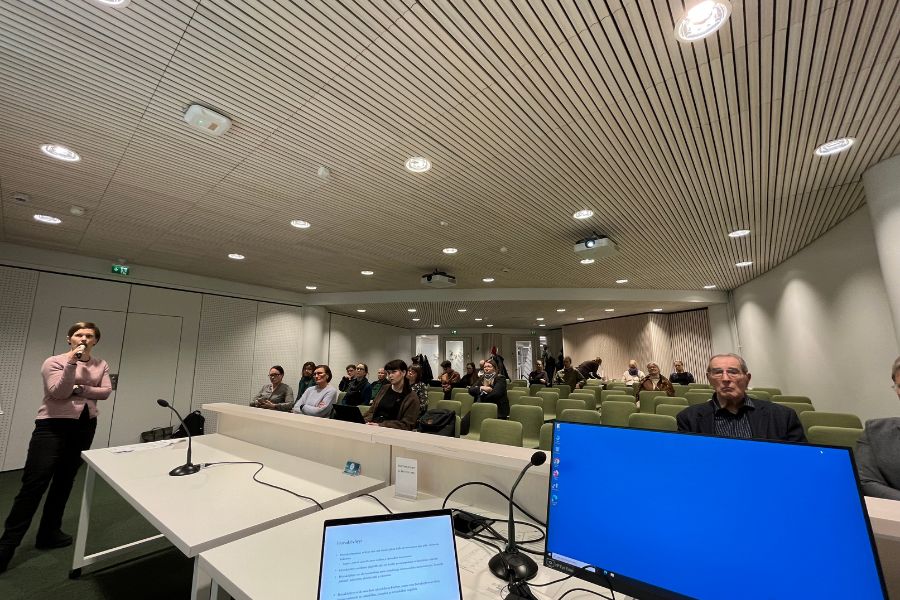Lessons from the first workshop: Living together (in) the urban space
The first workshop took place at Tampere University on 9 November, with the participation of Peik Erhola from Skeittitapuli, Leena Viitasaari from the City of Tampere and researchers Mikko Kyrönviita, Riina Lundman, Johanna Hokka and Antti Wallin from Tampere University.
Riina Lundman started the presentations by looking at the ethics of care in cities. According to Lundman, vulnerability is often seen as a problem in urban development, but the question could be approached differently by putting vulnerability and care at the heart of urban planning. Lundman also raised the importance of social infrastructures where people can receive care. Examples of such social infrastructures can be found in the City of Tampere’s Park meal events, which Leena Viitasaari presented at the workshop. The park meal events have been successful in reaching children and families in different regions during the summer, with more than 100 volunteers taking part. The park meal events demonstrate how urban spaces are being used for communal activities and care.
The question of how urban spaces are being used for care and communal activities was also strongly present in researcher Mikko Kyrönviita’s presentation on DIY skate parks as a way of caring for urban space and building communities. Kyrönviita described DIY skate parks as places of sharing, learning and caring, where politics is about changing everyday life. One practical example of such space creation is Skeittitapuli. In the workshop, Peik Erhola described how the self-organizing of skateboarders has since widened to include wide range of activities and actors available to Tampere youth, including meal and therapy services, leading to active city bringing care and nurturing where it was perceived to be lacking.
In the urban space, however, co-existence even in the context of care is not possible without conflicts. The importance of emotions and conflicts in urban space was highlighted by researchers Johanna Hokka and Antti Wallin. Hokka focused her presentation on how emotions create communities in urban space. Wallin discussed the city of the elderly and showed how conflicts can also be present when people shape the city to their liking. After the presentations the workshop continued with discussions first in small groups and then summarizing discussion with all participants.
Lessons from the second workshop: Care, community and support in later life

The second workshop was held in Metso Main Library on 28 November. This workshop focused on care and democracy from the perspective of elderly citizens. The workshop featured presentations by Muistiliitto (The Alzheimer Society of Finland), Tampereen vanhusneuvosto (Older people’s council of Tampere City), Mummolaakso (Granny valley) and Tampere Missio, and researchers Outi Jolanki, Liina Sointu, Lina Van Aerschot, Antti Wallin and Virve Repo from Tampere University.
Outi Jolanki opened the first half of the workshop by addressing senior housing and well-being. Jolanki’s call for community-centric approaches to aging challenged the conventional focus on aging in place. The discussions highlighted the importance of senior housing models that support independent living while fostering social activities, community participation, and mutual support. Mutual support came up also in The Alzheimer Society of Finland’s presentation, where peer support for people with dementia and their close ones is one of the main organizational activities and implemented, for instance, in Muistiluotsi centers.
Liina Sointu explored the theme of communal existence within urban spaces, with a focus on how older adults navigate and negotiate these environments. The presentation delved into the complexities of urban life, contrasting the idealized image of communal existence with the realities of diverse individuals sharing the urban space. Tarja Eho presented Tampere Missio’s efforts to provide places, services, and activities supporting older adults’ well-being and social inclusion. Places where people can come together and participate activities and social interaction, such as social hubs (Lähitorit), form an important social infrastructure that can facilitate mutual care and continuity in older adults’ everyday lives. At the end of the first half of the workshop Lina Van Aerschot raised a concern related to older adults’ unmet care needs and inequalities in care. She presented the concept of care poverty that refers to the situation where (older adults in particular) receive inadequate care services partially or entirely. In her presentation Van Aerschot pointed out how unmet care needs are not just an individual matter but a wider phenomenon that is linked to societal inequality and socio-economic disadvantage.
The second half of the workshop began with a presentation by Lissu Suhonen and Hillevi Häkkinen, two queer activists from Mummolaakso (Granny valley), which is a non-profit association that aims to promote solidarity, social interaction and well-being among older people among the LGBT+ community that identify as women. The association’s main activities are peer groups and events, such as dance parties, visits to cultural events and outdoor activities. The importance of peer-support, informal care and community events was highlighted in the presentation following the themes of earlier presentations. After Granny Valley, Virve Repo talked about affects and aging in suburban places. Aging in the suburb is not emotionally neutral as Repo noted. Concerns about safety, reduced services, accessibility issues, and winter maintenance can impact everyday life and cause emotional discomfort. Repo highlighted that feelings and emotions influence our perceptions and negotiations of space and the realities of aging in place.
The Older people’s council’s presentation included three short talks by Kari Itkonen, Taina Törmä and Mervi Hissa. They presented the work of the The Older People’s Council of Tampere City each from their own perspective. The talks covered the challenges of decision-making faced by older citizens, the importance of local services and current issues related to care and decision-making, such as the careworkes’ possibilities to be heard. In the last presentation of the workshop Antti Wallin discussed how older adults’ social practices change, produce and shape urban spaces. Older adults strive to shape the urban space and their everyday life as good as possible with the available social and material resources. Wallin also discussed informal care practices between older adults. Helping neighbors and caring for others is an important aspect of the way elderly people live together in the city and their social action in urban space. After the presentations there was time for discussions both in small groups and all participants together.
Conclusions: Deepening understanding of the connections between care and democracy in urban life
The workshops organized by the DRN shed a light on the intricate dynamics of care and democracy within urban spaces. At the heart of the presentations and discussions was the transformative potential of care, not merely as a reactive measure but as a proactive force reshaping the urban life.
One of the salient insights from the workshops was the need to reconceptualize urban spaces through the lens of care. The diverse initiatives, from DIY skate parks to communal meal events, social hubs, and the Granny Valley, underscore the multifaceted ways in which urban environments can be repurposed for fostering care and community-building. Such initiatives challenge conventional urban development paradigms and advocate for more inclusive, responsive, and human-centric approaches to city planning.
The workshops also underscored the important role of the third sector and active citizens in driving innovative care practices and community-building initiatives. Organizations like Skeittitapuli and the Granny Valley exemplify the potential of grassroots initiatives in fostering inclusive and supportive urban communities. However, the workshops also highlighted the pressing need to address inequalities in care provision, as evidenced by the concept of care poverty. Addressing these disparities highlights the need for a holistic approach that combines policy interventions with community-driven initiatives.
Fisher and Tronto define caring as: “an activity that includes everything that we do to maintain, continue, and repair our ‘world’ so that we can live in it as well as possible. That world includes our bodies, ourselves, and our environment, all of which we seek to interweave in a complex, life-sustaining web.” (Fisher & Tronto 1990, 4.) Building on Fisher and Tronto’s definition of care, the workshops highlighted that care is not only about human relations but also involves materiality and space. The discussions emphasized the role of shared spaces that are accessible to people of all abilities and the need for resources to ensure the continuity of care-related activities.
In conclusion, the workshops served as a platform for deepening our understanding of the connections between care and democracy in urban life and realizing the need for a broad understanding of care which relates to all citizens and their connection to one another as a basis for democracy. In relation to democracy, the participants in the workshops presented a lot of ways how active citizens are willing to shape their own lives and the lives of their fellow people through processes that better resemble forms of direct democracy; processes which are rarely involved with traditional avenues of politics. These more direct ways include active use of space and building new communal practices which can then in turn activate new participants, leading to vibrant scenes of societal participation centered around care and a sense of community. Our endeavors have lead us researchers to further develop our new ideas and findings and we hope that new research could be on the horizon.
Text: Anniriikka Rantala, Sonja Helkala, Matias Heikkilä & Anni Jäntti



